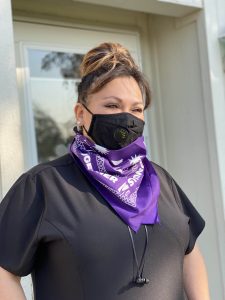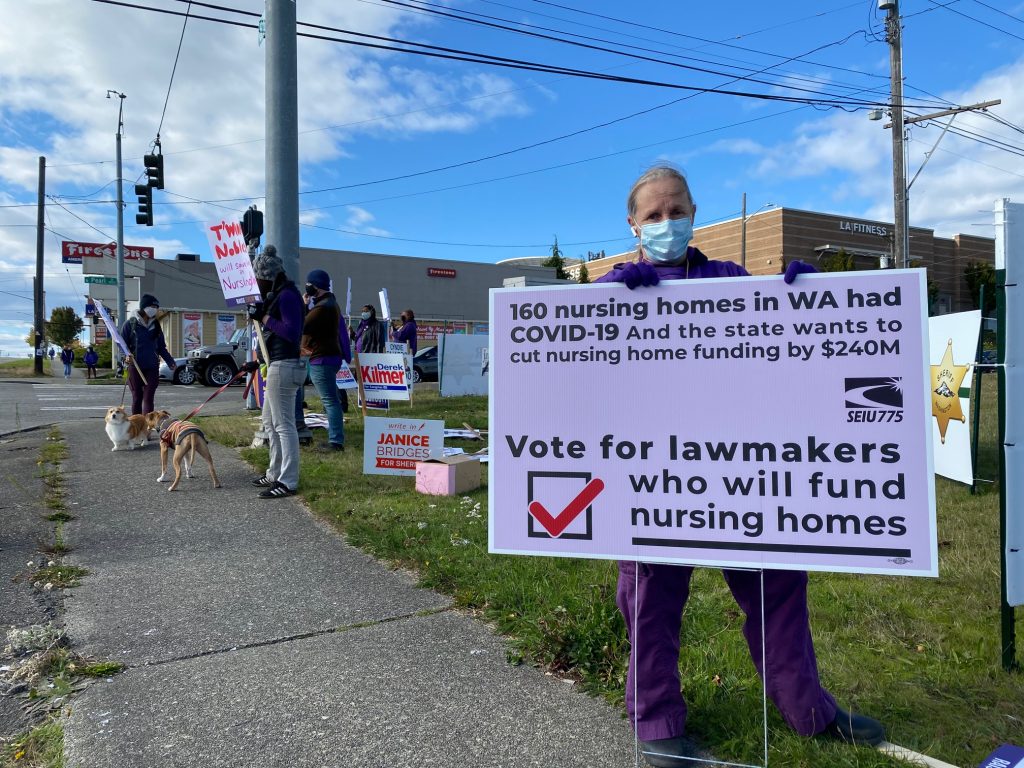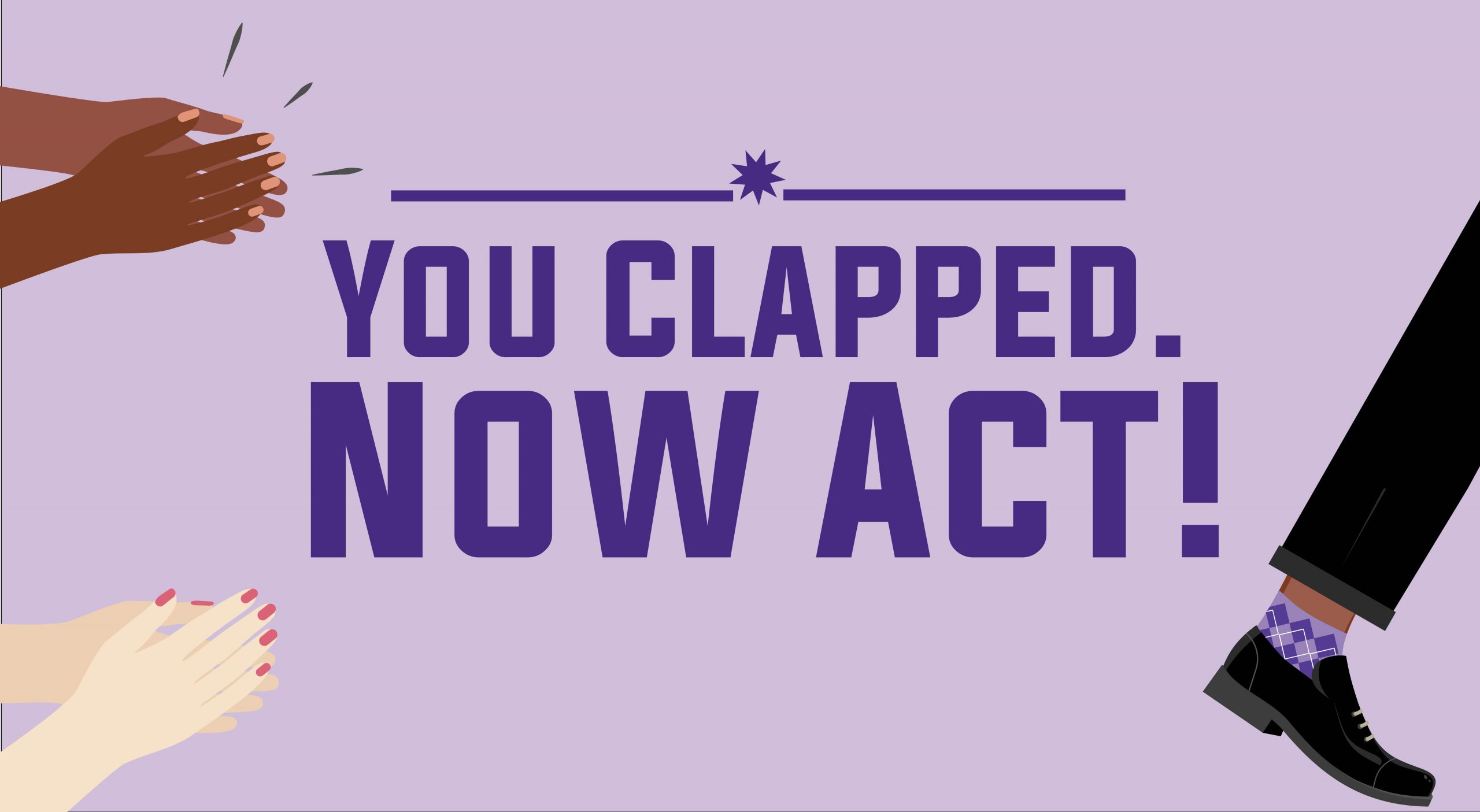This agenda is available in:
- Korean: SEIU 775 2021 입법 의제
- Russian: Законодательная повестка SEIU 775 на 2021 год
- Simplified Chinese: SEIU 775 2021 立法议程
- Spanish: Agenda legislativa de SEIU 775 para el 2021
- Vietnamese: Chương Trình Lập Pháp Năm 2021 của Công Đoàn SEIU 775
Our 2021 priorities
- Stop cuts to long-term care
- Rebalance our tax code to make the wealthy pay their share
- Fully fund our IP contract with Agency parity
- Fully fund Washington nursing homes
- Address the long-term care workforce shortage
- Justice and solidarity campaigns
- Criminal justice reform and police accountability
- Working Families Tax Credit
- Housing security and affordability
- Worker Protection Act
A note from SEIU 775 President Sterling Harders
Dear SEIU 775 Family,
We will talk about what we lived through in 2020 for the rest of our lives. It was a year of incredible heartache and loss and sadness and loneliness.
But that’s not all the year was. It was a year when we showed up like never before and fought for caregivers who were taking care of the people who are most vulnerable to this virus.
At the beginning of this pandemic, people across the country came together to clap for essential frontline workers like us to show their appreciation for the hard work we do to help our communities. While the clapping has stopped, caregivers are still hard at work serving our clients’ needs. That’s why we’re going into this legislative session with a campaign we’re calling You Clapped. Now Act!
As caregivers, we know how to hold our lawmakers accountable and demand change.
We will fight the cuts that have been proposed during the COVID-related budget crises because cutting long-term care funding in a pandemic is tantamount to neglect. While we have been risking our lives taking care of the country’s most vulnerable people, billionaires and millionaires have been getting rich – and it’s time they pay their fair share.
As we begin 2021, we will continue fighting to make sure caregivers are treated like the essential workers we are. We’ll need as many people as possible demanding change this year – because we’re stronger together.
In solidarity,
Sterling Harders
SEIU 775 President
Stop cuts to long-term care

“The pandemic has taken so much from so many of us and I came close to losing my life from COVID-19. If the State cuts funding to services, what will happen to my client? What will happen to my family? Why are we the ones that are being asked to tighten our belts?”
– SEIU 775 Member Brenda Morgan
Over the summer, DSHS proposed cuts of $1.1 billion in long-term care services for the elderly and people with disabilities. Long-term care workers – people who work in Nursing Homes and as in-home care providers – have always been on the frontlines of healthcare. We save lives, keep people out of crowded hospitals, and help Washington’s most vulnerable populations live their lives with dignity.
These proposed cuts would mean:
- More than 10,000 seniors and people with disabilities kicked off home care services[1] and more than 2,800 people kicked out of the nursing homes where they live. The service cuts disproportionately leave Black, Indigenous, and people of color without care and services.
- As many as 10,000 in-home caregivers will lose their jobs, resulting in a loss of $150 million in income per year to local economies. Black, Indigenous, and people of color home care and nursing home workers would be disproportionately harmed, losing a total of $99.7 million per year.
- Wages and benefits for in-home caregivers that keep their jobs would be cut by $50 million, a loss of about $1,300 a year for a full-time caregiver.
And while Governor Inslee’s budget does not cut any funding for long-term care, we must make sure the House and Senate Budgets don’t include ANY cuts to long-term care. Cuts to these critical Long-Term Services and Supports at any point in history is harmful – but during a pandemic, it is tantamount to neglect.
Fix our upside-down tax system and equitably rebuild our economy

“When quarantine came, did we stop caring for our clients? Absolutely not! We put our health and our lives on the line and continued providing care and services. The people that we care for needed us more than ever and we were there for them.”
– SEIU 775 Member Susie Young
Washington’s upside-down tax code disproportionately impacts lower income Washingtonians and perpetuates racial and gender inequalities. Despite all the gains we’ve made, most caregivers make just $16-17 per hour and average just $22,250 per year. Caregiving is work mostly done by women, and disproportionately by Black women, women of color and immigrants.
Legislators have a straight-forward choice: Underfund critical services like public health and childcare, which hurts people, families, and the economy OR raise taxes on those at the top to fund essential services, keep people working, and boost our economy.
Legislators can speed up Washington’s economic recovery by balancing our upside-down tax code to avoid reckless cuts to services, keep money flowing in our communities, and build an economy that works for everyone.
Fully fund the 2021-2023 Individual Provider contract with agency parity

“Cutting these budgets is not an option for us. It’ll devastate me, coming home and having to put food on the table for my child, having to have a roof over my head. I mean, I’m not going to live in my car.»
– SEIU 775 Member Olga Garcia
Bargaining with the State this year has been very different than our contract negotiations over the past decade. In the middle of a global pandemic and the COVID-induced economic downturn, together, we successfully bargained for our 2021-2023 IP contract with the State. Once funded, this contract will:
- Increase wages by 3% across the two years of the contract – keeping up with rising costs
- Keep our healthcare premiums affordable (but no expansion to dependent coverage)
- Continue supplying PPE at no cost to caregivers
- Protect us with strong HADit (Harassment Abuse & Discrimination) language
- Give credit for prior home care experience and include paid holidays
- This is in addition to everything we’ve already won! View the Caregiver Union Difference here.
Now our fight is focused on demanding the State Legislature fully fund our IP contract with agency parity, and make sure that all our clients continue to receive essential home care services.
Fully fund Washington nursing homes with annual rebase and inflation factors

COVID-19 has shined a light on the existing workforce shortages and chronic underfunding of skilled nursing facilities in Washington State. Nursing homes are underfunded by around $120M per year. Workers and residents suffer from this severe underfunding. Increasing reimbursement rates to ensure more competitive wages, access to affordable healthcare benefits, and important health and safety benefits like infection control standards, usable sick leave, and safe staffing ratios will all improve the quality of care for vulnerable residents.
We urge the Legislature to support an increase the direct and indirect care rates for 2022 through annual rebasing using the 2019 cost reports and the addition of an inflation adjustment.
Address the long-term care workforce shortage by removing discriminatory barriers to becoming a caregiver
Many potential caregivers are unable to work because of disqualifying crimes that show up in their background checks. This disproportionately impacts Black, Indigenous, and people of color communities because of structural racism in the criminal justice system.
A first step to addressing this problem would be to allow individuals who are eligible to vacate their charges or obtain a certificate of restoration the opportunity to enter the caregiving workforce. Washington should also allow clients the choice to allow individuals already providing unpaid care to become a trained, certified, and paid caregiver. This would be another step to remove discriminatory barriers that prevent people already doing the work from being paid for their labor.
Justice and solidarity campaigns
Criminal justice reform and police accountability
Black, Indigenous and people of color face many injustices at the hands of the criminal justice system. With families — particularly Black families – impacted by police brutality, Legislators have the opportunity this session to make historic victories for racial equity.
SEIU 775 supports community oversight boards, a ban on outdated tactics plus additional de-escalation training, independent investigations and prosecutions, establishing a statutory duty of care and strengthening the decertification process, and a private prison ban that will prevent any for-profit incarceration/detention of our communities in Washington.
Working Families Tax Credit (WFTC)
We need to make sure the wealthy pay their fair share and that Legislators provide economic relief for essential workers. The Working Families Tax Credit provides $500 in tax credits to working Washingtonians (plus an additional $150 per child up to three children). This helps get direct cash to our communities and is one major step leading us toward economic justice.
Including undocumented and recently documented workers in unemployment insurance
Although immigrants contribute to our everyday economy and community, they are excluded from safety net programs their taxes pay for. Including undocumented and recently documents workers in unemployment insurance ensures that everyone in our community is treated with dignity, can pay for essentials, and stay healthy or seek the care they need.
An estimated 141,000 renters in Washington are behind on rent since the pandemic began. Extending the eviction moratorium to March 31, 2021 will give families more protection and allow the Legislature to pass more protection for families impacted by COVID-19. Although individual cities have just cause, there is not statewide just cause.
We also support DSHS’s proposal to provide funds for rental assistance to help people afford housing and transition out of nursing homes once they no longer need that level of care. This ensures that people reenter their communities and are not stuck in a nursing home due to unaffordable rent.
Our labor standards are only as strong as our ability to enforce them, but the rise of forced arbitration is increasingly limiting workers’ ability to have complaints heard by a judge and jury. The Worker Protection Act will enable whistleblowers to file qui tam actions to hold corporations accountable for stolen wages, health & safety violations, and harassment & discrimination at work.
Health equity
From increasing access to dental care by allowing dental therapists in Washington, to increasing access to health services for immigrants, to anti-racist healthcare protocols and continuing education, our healthcare system needs to evolve to allow for equitable access to care for all Washingtonians, regardless of income, immigration status, or insurance coverage. Legislators need to ensure every Washingtonian receives the same access and care.
Climate justice is also a health issue, and legislators should support a carbon cap and invest in policy that will target companies that pollute our environment the most and strive to make sure we address environmental racism with an equity lens.
Broadband access
Although providing care as homecare and nursing home workers cannot be done remotely, many aspects of our daily lives are now happening online. Inequities in access and affordability to quality internet exist in tribal communities, rural cities, older Washingtonians and communities of color. Legislators should pass a bill to make access to the internet more affordable and more equitable for all.
[1] 6,397 clients receive in home care through ALTSA and 3,925 through DDA.

